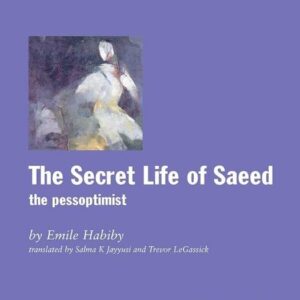The Secret Life of Saeed, the Pessoptimist, a 1974 novel by Emile Habiby, tackles the Israel-Palestine conflict with nuance, poignancy, and hilarity all at once. Through the story of a gullible, spineless Palestinian everyman who becomes an informant for the Zionist state, Habiby critiques the cruelty of the Israeli occupation and the failures of the Arab elite.
As translator Salma Khadra Jayyusi* notes in her introduction to the novel, humor may seem a surprising choice to take on this topic. Palestinian oppression has typically inspired nationalist poetry or passionate rhetoric. In fact, satire is rare in modern Arabic prose as a whole. This makes The Pessoptimist particularly unusual, as Habiby breaks with literary convention to provide a new angle on life as an Arab in Israel. The genre of the book is hard to pin down, shifting from comedy to tragedy with an element of fantasy mixed in. Habiby invents the term “pessoptimist” to mock the unique attitude of his protagonist, referencing Voltaire’s satire of foolish optimism in Candide. Yet although Habiby’s protagonist is no hero, he ensures that we still sympathize with his plight.
The Pessoptimist unfolds in three books, the first titled after Saeed himself, and the second two after his lovers Baqiyya and Yuaad. The names of all three characters are significant. Saeed’s name means “happy,” though he spends most of the book miserable; Baqiyya, a Palestinian woman whose marriage to Saeed is arranged by the state, is “the girl who stayed;” and Yuaad, Saeed’s childhood love, is “to be returned.” Each section is made up of letters written by Saeed to an unidentified reporter. From the very first chapter, humorously titled “Saeed Claims to Have Met Creatures from Outer Space,” Habiby is unafraid of being imaginative and outlandish at times, even in a novel about real history.
In each letter, Saeed updates the journalist on what has occurred in his life, beginning with his childhood and his experiences during the war of 1948. After the war, he sneaks back into Palestine, intent on following in the footsteps of his late father, who was a Zionist collaborator. He seems to have few qualms about informing on his own people. On the instructions of his Sephardic Jewish boss, Saeed dutifully targets communist activists. After his boss facilitates his marriage to Baqiyya, they have a son, Walaa. Having neglected their son for much of his childhood, Saeed and Baqiyya are shocked to find out that Walaa has become a fedaiy, or freedom fighter. Under threat from Israeli soldiers, Baqiyya desperately tries to convince her son to surrender and save his life. In response, Walaa critiques his parents’ cautious and submissive approach. He articulates what it has been like to grow up with only whispers and shame, leading Baqiyya to make a dramatic decision. In this scene, Habiby powerfully depicts two opposing perspectives on Palestinian resistance.
As the novel progresses and Saeed reencounters characters from his past, his worldview is sometimes challenged. Ultimately, the novel comes full circle, as Habiby fills in the gaps to explain how Saeed came to be with the “creatures from outer space” of the first chapter.
The Secret Life of Saeed, the Pessoptimist is a refreshing and accessible novel on a difficult subject, written by an author who was himself a Palestinian living in Israel. Emile Habiby was elected to the Knesset as a member of the Communist Party and also served as the Editor-in-Chief Al-Ittihad, a renowned Arabic newspaper in Israel. These personal experiences helped inform the novel’s insight into what it feels like to live as a second-class citizen.
Discussion Questions:
- How do you feel about Habiby’s use of supernatural elements in a story about real-world events? What is the relationship between imagination and reality in this novel?
- At one point in the novel, Israeli police tell Saeed, “Our democracy is just not right for you people” (136). How does irony work in this quote? What do you think is the critique that Habiby is making?
- In dream-like visions, Saeed finds himself suspended atop a stake. What do you think the stake symbolizes? How might it relate to Saeed’s day-to-day struggles?
- After reading this “pessoptimist” novel, do you find it to be more optimistic or pessimistic about the future of Palestinians? What messages do you take away about responses to oppression?
* Salma Khadra Jayyusi passed away seven months ago, on April 20, 2023. She was a highly celebrated Palestinian translator and author. The founder of the Project of Translation from Arabic, Jayyusi dedicated herself to bringing Arabic literature to English readers.


